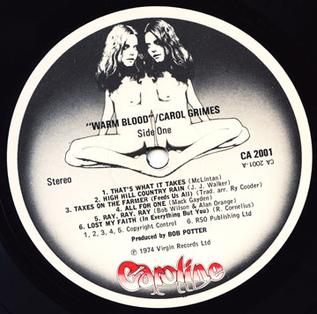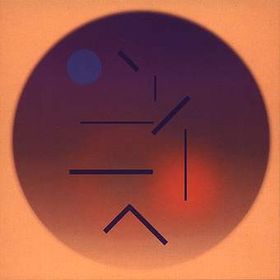
Caroline Records is a record label originally founded in 1973. Initially founded in the United Kingdom to showcase British progressive rock groups, the label ceased releasing titles in 1976, and then re-emerged in the United States in 1986. The label released the work of American punk rock, thrash metal and new wave music bands. Caroline had a number of subsidiary labels, including Astralwerks, Gyroscope, Caroline Blue Plate, Beat the World, Scamp and Passenger. In 2013, the brand was relaunched by Universal Music via the Capitol Music Group.

Holger Schüring, known professionally as Holger Czukay, was a German musician best known as a co-founder of the krautrock group Can. Described as "successfully bridg[ing] the gap between pop and the avant-garde", Czukay was also notable for having created early important examples of ambient music, for having explored "world music" well before the term was coined, and for having been a pioneer of sampling.

Geir Aule Jenssen is a Norwegian electronic musician and composer who records as Biosphere. A resident of Tromsø within the Arctic Circle, Jenssen is well known for ambient and ambient house pieces, often inspired by Arctic or mountain settings, and his use of loops and peculiar samples from science fiction and natural sources. His 1997 album Substrata was voted by the users of the Hyperreal.org website in 2001 as the best all-time classic ambient album. He has also composed several film scores.

John Joseph Wardle, known by the stage name Jah Wobble, is an English bass guitarist and singer. He became known to a wider audience as the original bass player in Public Image Ltd (PiL) in the late 1970s and early 1980s; he left the band after two albums.

Harold Montgomory Budd was an American composer and poet. Born in Los Angeles and raised in the Mojave Desert, he became a respected composer in the minimalist and avant-garde scene of Southern California in the late 1960s, and later became better known for his work with figures such as Brian Eno and Robin Guthrie. Budd developed what he called a "soft pedal" technique for playing piano, with use of slow playing and prominent sustain.

Julian Keith Levene was an English musician who was a founding member of both the Clash and Public Image Ltd (PiL). While Levene was in PiL, their 1978 debut album Public Image: First Issue reached No 22 in the UK album charts, and its lead track Public Image broke the top 10 UK singles chart.

Attilio Joseph "Teo" Macero was an American jazz saxophonist, composer, and record producer. He was a producer at Columbia Records for twenty years. Macero produced Miles Davis' Bitches Brew, and Dave Brubeck's Time Out, two of the best-selling and most influential jazz albums of all time. Although the extent of his role has been disputed, he also has been associated with the production of Davis' 1959 album Kind of Blue, jazz's best-selling record. Macero was known for his innovative use of editing and tape manipulation unprecedented in jazz and proving influential on subsequent fusion, experimental rock, electronica, post-punk, no wave, and acid jazz.

Ambient 3: Day of Radiance (1980) is an album by the American ambient musician Laraaji, which was produced by Brian Eno.

Thursday Afternoon is the tenth solo studio album by British ambient musician Brian Eno consisting of one 60-minute eponymous composition. It is the rearranged soundtrack to an 80-minute video production of the same title made in 1984.

The Shutov Assembly is the thirteenth solo studio album by British musician Brian Eno, released on 10 November 1992 on Warner. One of Eno's ambient albums, it was reissued in 2014 with a second disc with bonus tracks.

Music for Films III is the third entry in Brian Eno's "Music for Films" series. Unlike entries in the past, this record features tracks credited to Brian Eno, Roger Eno, Michael Brook, and Harold Budd among others, with Brian Eno involved with the production of all tracks.

A Year with Swollen Appendices is a book by Brian Eno. The paperback book was published by Faber and Faber in 1996 and is divided into two sections. The first part is a diary covering the year 1995, the second part, the 'swollen appendices' of the title is a collection of essays, short stories and correspondence. It was re-released with a new introduction by the author in 2021.

The discography of Brian Eno, English electronic musician, music theorist and record producer, primarily consists of 29 solo studio albums, 22 collaborative studio albums, 18 compilation albums, one remix album, four video albums, nine extended plays, and 27 singles.

Music for Civic Recovery Centre is the twenty-first solo studio album from British musician Brian Eno, released in 2000.

Kite Stories is the twentieth solo studio album from British musician Brian Eno, released in 1999.

I Dormienti is the nineteenth solo studio album from British musician Brian Eno, released in 1999. It is also the title of an art-book by Eno and Italian artist Mimmo Paladino, released in 2000, packaged with a copy of the album and featuring pictures & sketches of the installation from which the music is drawn.

Brian Peter George St John le Baptiste de la Salle Eno is a British musician, composer, record producer and visual artist best known for his contributions to ambient music and work in rock, pop and electronica. A self-described "non-musician", Eno has helped introduce unconventional concepts and approaches to contemporary music. He has been described as one of popular music's most influential and innovative figures. In 2019, Eno was inducted into the Rock and Roll Hall of Fame as a member of Roxy Music.
"Slug" is a song by Passengers, a side project of rock band U2 and musician Brian Eno. It is the second track on Passengers' only release, the 1995 album Original Soundtracks 1. The track was originally titled "Seibu" and was almost left off the album before it was rediscovered later during the recording sessions. Though Eno made most of the creative decisions during the recording sessions, "Slug" was one of the few tracks that the members from U2 tried to craft themselves.
Jon Klein is an English guitarist and producer, best known for being a member of Siouxsie and the Banshees for seven years, from 1987 until 1994. Klein has worked for other artists including Talvin Singh and Sinéad O'Connor. More recently he has worked as a co-producer and guitarist with Fangoria, Space Tribe, ESP, Shriekback, Micko and the Mellotronics and Jah Wobble.

















